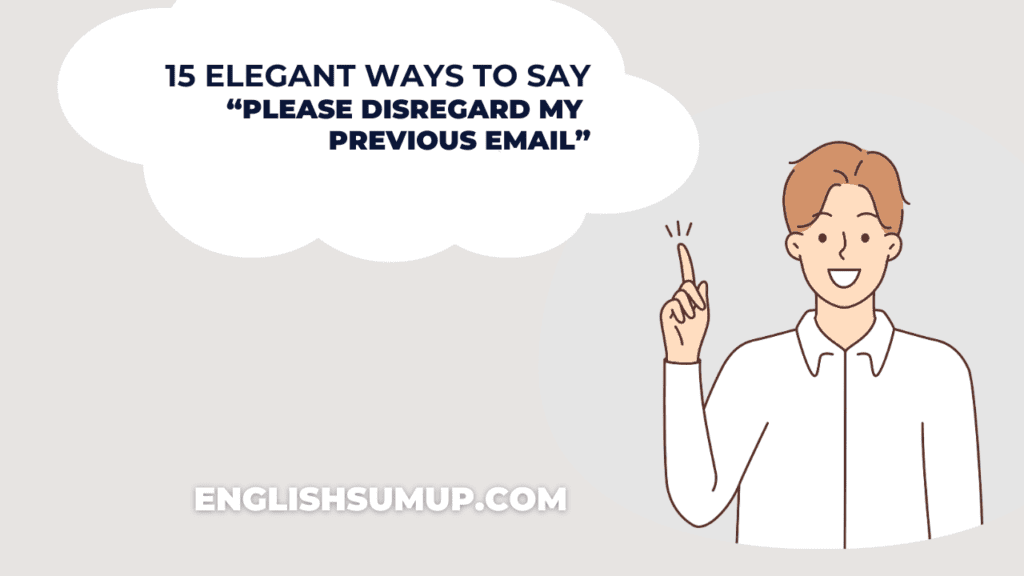In the fast-paced world of emails, sometimes we need to correct ourselves or clarify things. Saying “Please disregard my previous email” is a polite way to retract or correct information you’ve previously sent. However, there are more effective and professional ways to convey this message. Here, we’ll explore why it’s important to phrase this request carefully and provide 20 alternative ways to effectively communicate this message.
You may love this one: 9 Best alternatives of “Thanks for the Reminder”
Why should we say this and not say this:
It’s important to use clear and respectful language when asking someone to disregard a previous email. Saying it directly helps avoid confusion and ensures the recipient understands your intent clearly. On the other hand, phrases like “Forget about my last email” can come off as too casual or abrupt, potentially undermining your professionalism.
List of synonyms of “Please Disregard My Previous Email”
- Disregard my previous message.
- Ignore my last email.
- Please disregard my earlier correspondence.
- Kindly disregard my previous email.
- I apologize for any confusion caused by my previous email.
- Let’s disregard my previous message.
- My apologies, please disregard my previous email.
- Please disregard the email I sent earlier.
- Disregard my previous communication.
- I’d like to retract my previous email.
- Disregard my earlier email on this matter.
- Please disregard the email I sent a moment ago.
- Can you ignore my previous message?
- Please disregard the last email I sent.
- I apologize; please disregard my previous email.
- Kindly disregard my earlier message.
- Please ignore the email I sent before this one.
- Let’s pretend my previous email didn’t happen.
- I retract my earlier email; please disregard.
- Please disregard the message I sent previously.
Disregard my previous message:
This phrase is a straightforward request for the recipient to ignore the content of your earlier message. It is clear and concise, suitable for informal or formal communication.
Subject: Correction – Meeting Time
Hi John,
I hope this message finds you well. I’m writing to ask you to disregard my previous message about the meeting time at 2:00 PM. The correct time is now scheduled for 3:00 PM due to unforeseen circumstances. I apologize for any confusion this may have caused.
Thank you for your understanding and flexibility.
Best regards,
Devon
ALSO READ: Ways to Say “Sit Back and Relax”:
Ignore my last email:
This phrase directs the recipient not to consider the information in your most recent email. It’s a direct and effective way to retract information or clarify misunderstandings.
Subject: Urgent Update – Project Deadline
Hi John
I hope you’re well. Could you please ignore my last email regarding the project deadline? There have been new developments, and I will send you the updated timeline shortly.
Thank you for your patience and understanding.
Regards,
Devon
Please disregard my earlier correspondence:
Use this formal request to ask the recipient to disregard any previous communication you’ve sent. It indicates a level of formality and respect, particularly useful in professional settings.
Subject: Important Update – Budget Proposal
Hi John,
I apologize for any confusion caused. Please disregard my earlier correspondence regarding the budget proposal. Upon review, we’ve decided to take a different approach, and I’ll update you on the revised plan shortly.
Thank you for your attention to this matter.
Best regards,
Devon
Kindly disregard my previous email:
This phrase combines politeness with a clear request for the recipient to ignore your previous email. It maintains a professional tone while correcting any misinformation or updates.
Subject: Update – Travel Arrangements
Hi John,
I hope you’re well. Kindly disregard my previous email regarding the travel arrangements. There have been changes, and I will send you the updated itinerary shortly.
Thank you for your understanding and flexibility.
Best regards,
Devon
I apologize for any confusion caused by my previous email:
This phrase acknowledges any confusion or inconvenience your previous email may have caused and aims to clarify the correct information.
Subject: Clarification – Project Update
Hi John,
I hope this email finds you well. I apologize for any confusion caused by my previous email regarding the project update. To clarify, [briefly explain correct information or provide updates].
Please let me know if you have any questions or need further clarification.
Best regards,
Devon
Let’s disregard my previous message:
This phrase suggests mutual agreement to ignore your previous message, fostering open communication and ensuring both parties are on the same page moving forward.
Subject: Revision – Action Plan
Hi John,
I hope you’re doing well. Let’s disregard my previous message about the action plan. After further discussion, we’ve decided on a different approach, and I’ll update you with the revised plan shortly.
Thank you for your cooperation and understanding.
Regards,
Devon
My apologies, please disregard my previous email:
This phrase combines an apology with a formal request for the recipient to disregard your previous email, ensuring clarity and maintaining professionalism.
Subject: Urgent Update – Task Assignment
Hi John,
My apologies for any confusion caused. Please disregard my previous email regarding the task assignment. There have been updates, and I’ll provide you with the revised details shortly.
Thank you for your attention to this matter.
Best regards,
Devon
Please disregard the email I sent earlier:
This direct request instructs the recipient to ignore the email you sent earlier, often used when urgent updates or corrections are necessary.
Subject: Update – Project Status
Hi John,
I hope you’re well. Please disregard the email I sent earlier today about the project status. Upon further review, we’ve made adjustments, and I’ll update you with the new information shortly.
Thank you for your understanding and cooperation.
Best regards,
Devon
Disregard my previous communication:
This phrase requests the recipient to disregard any form of communication you’ve previously sent, ensuring that outdated or incorrect information is not considered.
Subject: Correction – Sales Report
Hi John,
I hope this message finds you well. Could you please disregard my previous communication regarding the sales report? There were errors, and I’ll send you the corrected figures shortly.
Thank you for your understanding and cooperation.
Best regards,
Devon
ALSO READ: Ways to Say “Sleep Well”
I’d like to retract my previous email:
This phrase formally withdraws your previous email, indicating that the information contained within it is no longer valid or accurate.
Subject: Retraction – Proposal Submission
Hi John,
I’d like to formally retract my previous email regarding the proposal submission. Upon review, we’ve identified areas for improvement, and I’ll provide you with the updated proposal shortly.
Thank you for your understanding and patience.
Best regards,
Devon
Disregard my earlier email on this matter:
Use this phrase to specify that any email you’ve sent previously on a particular issue should be disregarded, particularly when there’s been a change or update.
Subject: Update – Meeting Agenda
Hi John,
I hope you’re doing well. Please disregard my earlier email on the meeting agenda. We’ve made revisions, and I’ll send you the updated agenda shortly.
Thank you for your attention to this matter.
Best regards,
Devon
Please disregard the email I sent a moment ago:
This phrase indicates a very recent email that should be disregarded, often used when immediate corrections or updates are necessary.
Subject: Urgent Update – Schedule Change
Hi John,
I hope this email finds you well. Please disregard the email I sent a moment ago regarding the schedule change. There have been further adjustments, and I’ll provide you with the updated details shortly.
Thank you for your understanding and flexibility.
Best regards,
Devon
Can you ignore my previous message?:
This phrase directly asks the recipient to ignore your previous message, seeking to prevent any misunderstandings or actions based on outdated information.
Subject: Clarification – Project Update
Hi John,
I hope you’re doing well. Could you please ignore my previous message about the project update? We’ve made significant changes, and I’ll send you the updated plan shortly.
Thank you for your cooperation and understanding.
Best regards,
Devon
Please disregard the last email I sent:
Use this phrase to specify that the last email you sent should be disregarded, ensuring the recipient does not act upon outdated or incorrect information.
Subject: Update – Client Meeting
Hi John,
I hope this message finds you well. Please disregard the last email I sent regarding the client meeting details. We’ve had a change in venue, and I’ll provide you with the updated information shortly.
Thank you for your understanding and flexibility.
Best regards,
Devon
I apologize; please disregard my previous email:
Combines an apology with a request for the recipient to disregard your previous email, ensuring clear communication and maintaining professionalism.
Subject: Correction – Sales Report
Hi John,
I apologize for any confusion caused. Please disregard my previous email with the sales report attached. There were inaccuracies, and I’ll send you the correct information shortly.
Thank you for your understanding and patience.
Best regards,
Devon
Kindly disregard my earlier message:
This polite request asks the recipient to disregard any earlier message you sent, ensuring that outdated or incorrect information is not considered.
Subject: Update – Project Status
Hi John,
I hope you’re doing well. Kindly disregard my earlier message regarding the project status. We’ve made updates, and I’ll provide you with the current details shortly.
Thank you for your attention to this matter.
Best regards,
Devon
Please ignore the email I sent before this one:
Directly specifies that the email sent immediately before the current one should be disregarded, often used when immediate corrections are necessary.
Subject: Urgent Update – Task Assignment
Hi John,
I hope you’re well. Please ignore the email I sent before this one regarding the task assignment. There have been changes, and I’ll update you shortly.
Thank you for your understanding and cooperation.
Best regards,
Devon
Let’s pretend my previous email didn’t happen:
This phrase suggests a mutual agreement to disregard your previous email, fostering open communication and ensuring both parties are aligned moving forward.
Subject: Revision – Meeting Agenda
Hi John,
I hope this message finds you well. Let’s pretend my previous email about the meeting agenda didn’t happen. We’ve decided on a different approach, and I’ll update you with the revised agenda shortly.
Thank you for your understanding and flexibility.
Best regards,
Devon
I retract my earlier email; please disregard:
Formally withdraws your earlier email and requests the recipient to disregard it, indicating that the information contained within it is no longer valid or accurate.
Subject: Retraction – Policy Proposal
Hi John,
I hope you’re well. I’d like to formally retract my earlier email regarding the policy proposal. Upon further review, we’ve decided to take a different approach, and I’ll provide you with the updated proposal shortly.
Thank you for your understanding and patience.
Best regards,
Devon
Please disregard the message I sent previously:
This straightforward request asks the recipient to disregard any message you sent earlier, ensuring that outdated or incorrect information is not considered.
Subject: Update – Inventory Report
Hi John,
I apologize for any confusion caused. Please disregard the message I sent previously regarding the inventory report. We’ve had updates, and I’ll send you the corrected report shortly.
Thank you for your attention to this matter.
Best regards,
Devon
ALSO READ: Elegant Ways to Say “It’s Up to You”
Conclusion:
In conclusion, mastering the art of requesting to disregard a previous email is crucial for maintaining clear and effective communication. Whether you opt for a direct request like “Disregard my previous message” or choose a more polite approach such as “Kindly disregard my earlier communication,” each phrase serves to correct misunderstandings, update information, or retract erroneous details.
Using these phrases appropriately not only demonstrates professionalism but also shows respect for the recipient’s time and ensures that everyone involved is on the same page. The accompanying email templates illustrate how each phrase can be applied in various scenarios, from correcting meeting times to updating project details.
By employing these strategies, you can navigate communication challenges with ease, fostering better understanding and collaboration in both professional and personal contexts. Clear communication is key to building trust and maintaining productive relationships, making the ability to retract or correct information an invaluable skill in today’s fast-paced world of email correspondence.










